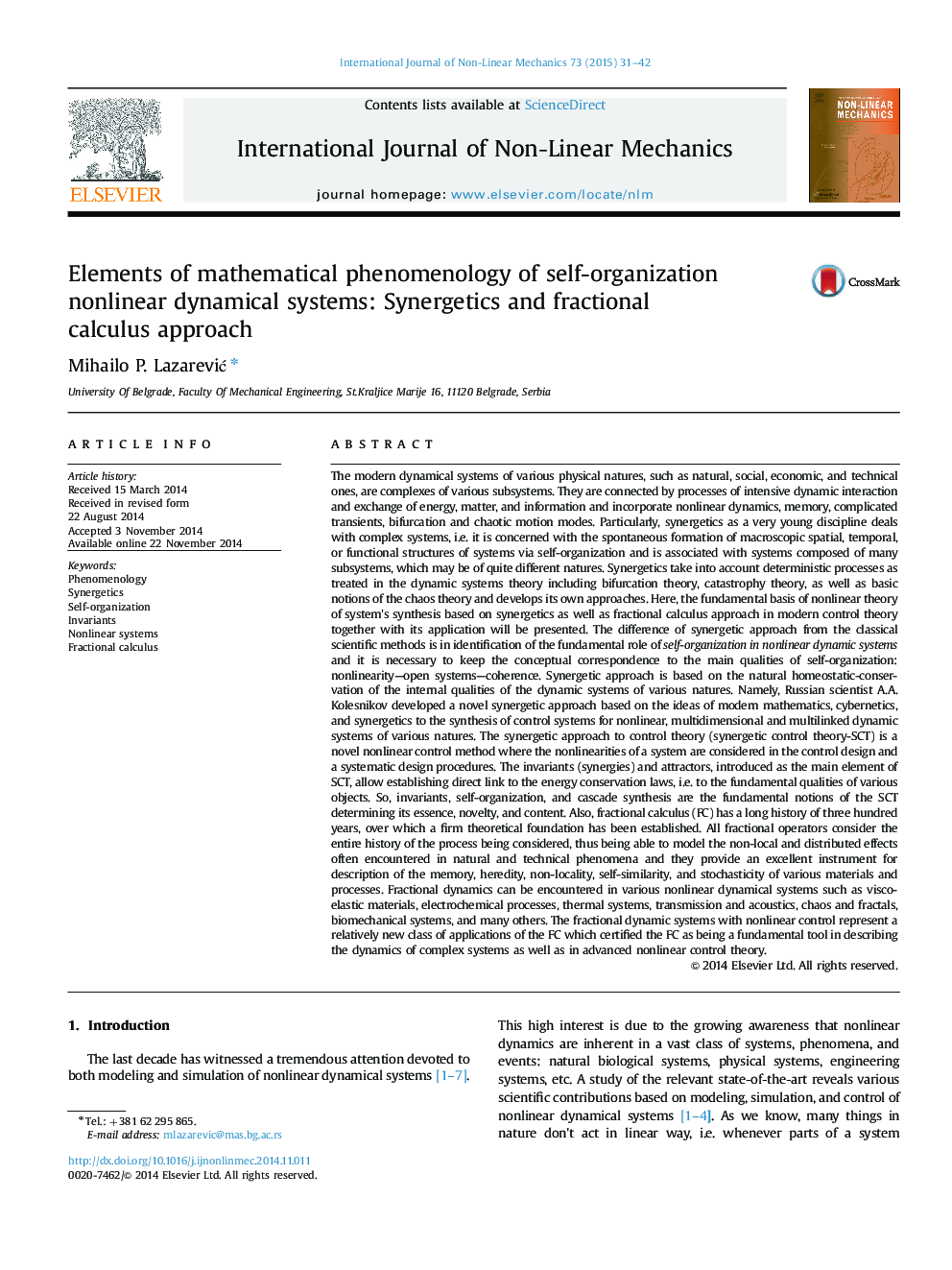| کد مقاله | کد نشریه | سال انتشار | مقاله انگلیسی | نسخه تمام متن |
|---|---|---|---|---|
| 783555 | 1465322 | 2015 | 12 صفحه PDF | دانلود رایگان |
• Elements of mathematical phenomenology of self-organization dynamical systems are presented.
• Synergetics approach is presented based on self-organization and the concepts of co-ordination.
• Fractional calculus approach is suggested to describe complex systems and processes.
The modern dynamical systems of various physical natures, such as natural, social, economic, and technical ones, are complexes of various subsystems. They are connected by processes of intensive dynamic interaction and exchange of energy, matter, and information and incorporate nonlinear dynamics, memory, complicated transients, bifurcation and chaotic motion modes. Particularly, synergetics as a very young discipline deals with complex systems, i.e. it is concerned with the spontaneous formation of macroscopic spatial, temporal, or functional structures of systems via self-organization and is associated with systems composed of many subsystems, which may be of quite different natures. Synergetics take into account deterministic processes as treated in the dynamic systems theory including bifurcation theory, catastrophy theory, as well as basic notions of the chaos theory and develops its own approaches. Here, the fundamental basis of nonlinear theory of system׳s synthesis based on synergetics as well as fractional calculus approach in modern control theory together with its application will be presented. The difference of synergetic approach from the classical scientific methods is in identification of the fundamental role of self-organization in nonlinear dynamic systems and it is necessary to keep the conceptual correspondence to the main qualities of self-organization: nonlinearity—open systems—coherence. Synergetic approach is based on the natural homeostatic-conservation of the internal qualities of the dynamic systems of various natures. Namely, Russian scientist A.A. Kolesnikov developed a novel synergetic approach based on the ideas of modern mathematics, cybernetics, and synergetics to the synthesis of control systems for nonlinear, multidimensional and multilinked dynamic systems of various natures. The synergetic approach to control theory (synergetic control theory-SCT) is a novel nonlinear control method where the nonlinearities of a system are considered in the control design and a systematic design procedures. The invariants (synergies) and attractors, introduced as the main element of SCT, allow establishing direct link to the energy conservation laws, i.e. to the fundamental qualities of various objects. So, invariants, self-organization, and cascade synthesis are the fundamental notions of the SCT determining its essence, novelty, and content. Also, fractional calculus (FC) has a long history of three hundred years, over which a firm theoretical foundation has been established. All fractional operators consider the entire history of the process being considered, thus being able to model the non-local and distributed effects often encountered in natural and technical phenomena and they provide an excellent instrument for description of the memory, heredity, non-locality, self-similarity, and stochasticity of various materials and processes. Fractional dynamics can be encountered in various nonlinear dynamical systems such as visco-elastic materials, electrochemical processes, thermal systems, transmission and acoustics, chaos and fractals, biomechanical systems, and many others. The fractional dynamic systems with nonlinear control represent a relatively new class of applications of the FC which certified the FC as being a fundamental tool in describing the dynamics of complex systems as well as in advanced nonlinear control theory.
Journal: International Journal of Non-Linear Mechanics - Volume 73, July 2015, Pages 31–42
